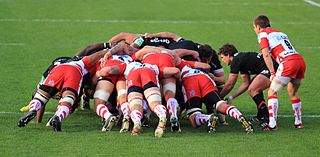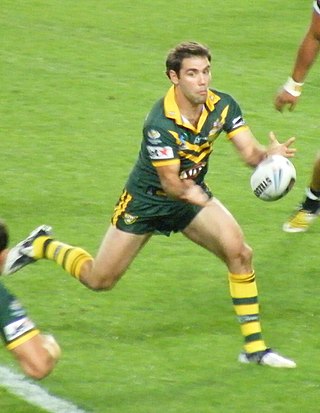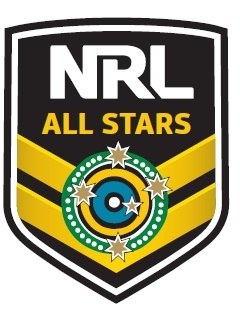In rugby football, the offside rule prohibits players from gaining an advantage from being too far forward. The specifics of the rule differ between the two major codes.

A scrummage, commonly known simply as a scrum, is a method of restarting play in rugby football that involves players packing closely together with their heads down and attempting to gain possession of the ball. Depending on whether it is in rugby union or rugby league, the scrum is used either after an accidental infringement or when the ball has gone out of play. Scrums occur more often, and are now of greater importance, in union than in league. Starting play from the line of scrimmage in gridiron football is derived from the scrum.

A line-out or lineout is a means by which, in rugby union, play is restarted after the ball has gone into touch. When the ball goes out of the field of play, the opposing team is normally awarded a line-out; the exception is after the ball is kicked into touch from a penalty kick, when the team that was awarded the penalty throws into the line-out. In 2021 World Rugby began trialling what was dubbed the "50:22" rule, wherein the kicking team has the throw-in if the ball travels from the kicker's half and bounces beyond the opposing 22-meter line. This was inspired by rugby league's 40/20 kick.
A free kick in rugby union is usually awarded to a team for a technical offence committed by the opposing side. Free kicks are awarded for technical offences such as playing too many players in a line-out or time wasting at a scrum. A free kick is also awarded for making a mark.
In rugby union, a player may mark a ball, which means that the player may catch it and cannot be tackled by rival players. The marking player can choose to take a free-kick or a scrum at the position of the mark.

A goal kick is a method of restarting the play in a game of association football. Its procedure is dictated by Law 16 of the Laws of the Game.

Like most forms of modern football, rugby league football is played outdoors on a rectangular grass field with goals at each end that are attacked and defended by two opposing teams. The rules of rugby league have changed significantly over the decades since rugby football split into the league and union codes. This article details the modern form of the game and how it is generally played today, although rules do vary slightly between specific competitions.

A comparison of American football and rugby union is possible because of the games' shared origins, despite their dissimilarities.
The experimental law variations (ELVs) were a proposed set of amendments to the laws of rugby union. They were proposed by the sport's governing body, the International Rugby Board (IRB), and trialled games at Stellenbosch University in 2006. In 2008 thirteen of the 23 variations trialled were played globally including; greater responsibility for assistant referees, corner posts no longer considered to touch in-goal, no gain in ground if the ball is moved into the 22-metre line by a player from the same team as the kicker, quick throw ins can travel backwards, no restrictions to players in the lineout, restrictions on where receivers and opposition hookers can stand in a lineout, pregripping and lifting allowed, mauls can be pulled down and players can enter with their head and shoulders lower than their hips, offside line is five metres away from the scrum for the backs and scrum half must be positioned close to the scrum, all offences apart from foul play and offsides are a free kick, and unplayable rucks and mauls are restarted with a free kick. In 2009 the IRB approved ten of the laws, rejecting the laws relating to mauls, numbers in a lineout and the increase in sanctions punishable by free kicks.

Rugby union is a contact sport that consists of two teams of fifteen players. The objective is to obtain more points than the opposition through scoring tries or kicking goals over eighty minutes of playing time. The play is started with one team drop-kicking the ball from the halfway line towards the opposition. The rugby ball can be moved up the field by either carrying it or kicking it. However, when passing the ball it can only be thrown laterally or backward. The opposition can stop players moving up the field by tackling them. Only players carrying the ball can be tackled and once a tackle is completed the opposition can compete for the ball. Play continues until a try is scored, the ball crosses the side line or dead-ball line, or an infringement occurs. After a team scores points, the non-scoring team restarts the game at the halfway with a drop kick toward the opposition. The team with the most points at the end wins the game.
This is a general glossary of the terminology used in the sport of rugby union. Where words in a sentence are also defined elsewhere in this article, they appear in italics.
Rugby league football has accrued considerable jargon to describe aspects of the game. Many terms originate in the Laws of the Game. Some aspects of the game have more than one term referring to them. Different terms have become popularly used to describe an aspect of the game in different places, with notable differences between the Northern and Southern Hemispheres.

The 2007 Rugby World Cup final was a rugby union match, played on Saturday, 20 October 2007 at the Stade de France, Saint-Denis, Paris, to determine the winner of the 2007 Rugby World Cup. South Africa beat England 15–6. Having also won the 1995 tournament, South Africa became the second country to win two World Cups, following Australia, who won in 1991 and 1999.

In rugby union a scrum is a means of restarting play after a minor infringement. It involves up to eight players from each team, known as the pack or forward pack, binding together in three rows and interlocking with the three opposing teams front row. At this point the ball is fed into the gap between the two forward packs and they both compete for the ball to win possession. Teams can be penalised for intentionally causing the scrum to collapse, and for not putting the ball into the scrum correctly. A scrum is most commonly awarded when the ball is knocked forward, or passed forward, or when a ball becomes trapped in a ruck or maul. Because of the physical nature of scrums, injuries can occur, especially in the front row.
A penalty in rugby union is the main disciplinary sanction available to the referee to penalise a team who commit deliberate infringements. The team who did not commit the infringement are given possession of the ball and they may either kick it towards touch, attempt a place kick at goal, or tap the ball with their foot and run. It is also sometimes used as shorthand for penalty goal.
In rugby league football, the Laws of the Game are the rules governing how the sport is played. The Laws are the responsibility of the Rugby League International Federation, and cover the play, officiating, equipment and procedures of the game.

The Rugby League All Stars Match of the National Rugby League is an annual rugby league football match between the specially-formed Indigenous All Stars and an All Stars team, both of whose members are made available for selection public vote. The game has been played since 2010 at a variety of venues across Australia. The player judged man-of-the-match is awarded the Preston Campbell Medal, named after indigenous Gold Coast player, Preston Campbell. Between 2010 and 2015, the Indigenous All Stars opponent was an NRL All Stars team, they were replaced for 2016 by a World All Stars team.

The laws of Rugby Union are defined by World Rugby and dictate how the game should be played. They are enforced by a referee, generally with the help of two assistant referees.

Futsal began in the 1930s in South America as a version of association football, taking elements of its parent game into an indoor format so players could still play during inclement weather. Over the years, both sports have developed, creating a situation where the two sports share common traits while also hosting various differences.

A free kick is a method of restarting play in association football. It is awarded after an infringement of the laws by the opposing team.













